

Explicit cookie consent. “SPOILS of war,” snaps Dabiq, the English-language journal of Islamic State (IS).
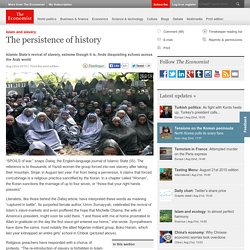
The reference is to thousands of Yazidi women the group forced into sex slavery after taking their mountain, Sinjar, in August last year. Far from being a perversion, it claims that forced concubinage is a religious practice sanctified by the Koran. In a chapter called “Women”, the Koran sanctions the marriage of up to four wives, or “those that your right hands possess”. Literalists, like those behind the Dabiq article, have interpreted these words as meaning “captured in battle”. Its purported female author, Umm Sumayyah, celebrated the revival of Islam’s slave-markets and even proffered the hope that Michelle Obama, the wife of America’s president, might soon be sold there.
Contro quali civiltà e religioni è stato ordinato di compiere il jihad da parte dell’Islam, affinché lo accettino o siano uccisi? E nei confronti di quali nazioni ha ordinato di fare il jihad affinché accettino l’Islam o paghino un tributo? - Archivio dom. La chiara religione islamica è l’ultima delle religioni celesti ed è la religione prescelta da Iddio l’Altissimo per tutta l’umanità; ciò può essere appreso da diversi versetti del sacro Corano, per esempio Iddio nel Corano dice: “Oggi vi ho reso perfetta la vostra religione, ho completato su di voi la Mia grazia e ho scelto l’Islam come religione per voi”.[1] Con l’avvento della sharia islamica in qualità di religione più completa tra quelle passate, il volere di Dio era che da quel momento in poi tutti, anche i seguaci delle religioni passate, divenissero musulmani, cambiassero la propria religione con l’Islam e obbedissero alle regole della nuova religione.
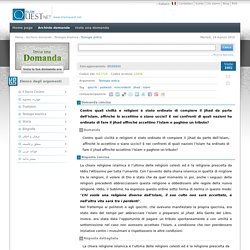
Iddio, il Sublime, ha espresso questo ordine sotto forma di norma in questo modo: “Chi vuole una religione diversa dall'Islam, il suo culto non sarà accettato, e nell'altra vita sarà tra i perdenti”.[2] I politeisti Gli ipocriti La Gente del Libro. Euthanasia debate: Professor Peter Singer versus Archbishop Anthony Fisher OP. 65 Reasons to Believe Jesus Did Not Die on the Cross. Posted by Mirza Ghulam Rabbi 1.

Why crucifixion? Jews wanted him to be killed through crucifixion, so they can prove that Jesus is not a beloved of God, rather the curse of God is on him. Jews could have killed him easily as they were in hundreds of thousands in number and very strong. If killing should have been their desire, they could have done it easily. 2. Explicit cookie consent.
ON January 11th up to 4m French people took to the streets in defiance of terror, and in defence of free speech, after Islamist gunmen shot dead 12 people at the offices of Charlie Hebdo, a satirical newspaper.

They were joined in Paris by world leaders, and by tens of thousands of sympathisers in cities round the globe, united under the slogan of solidarity “Je suis Charlie”. Yet in some corners—and even among writers, whose profession depends on the right to free expression—a dissenting minority voiced disapproval of the French paper’s cartoons. This quarrel turned into an open rebellion after six authors decided to boycott a gala dinner, to be held on May 5th in New York, at which Charlie Hebdo is due to receive a prize for courage.
The event is organised by PEN America, a body dedicated to defending free speech. Real Time with Bill Maher: The War on ISIS (HBO) Maher To President Obama: Stop Respecting Saudis' Medival Bullsh*t' Real Time with Bill Maher: Is ISIS Islamic? (HBO) Islamophobia. Islamophobia is a term for prejudice against, hatred towards, or fear of the religion of Islam, Muslims, or of ethnic groups perceived to be Muslim.
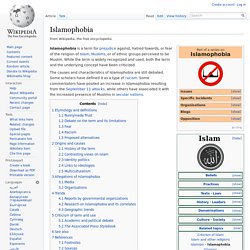
While the term is widely recognized and used, both the term and the underlying concept have been criticized. The causes and characteristics of Islamophobia are still debated. Some scholars have defined it as a type of racism. Some commentators have posited an increase in Islamophobia resulting from the September 11 attacks, while others have associated it with the increased presence of Muslims in secular nations. Etymology and definitions[edit] The word Islamophobia is a neologism[1] formed from Islam and -phobia, a suffix used in English to form "nouns with the sense ‘fear of ——’, ‘aversion to ——’ Liberal movements within Islam. Liberal movements within Islam involve professed Muslims who have produced a considerable body of liberal thought[1][2] on the re-interpretation and reform of Islamic understanding and practice.
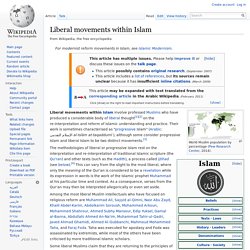
Their work is sometimes characterised as "progressive Islam" (Arabic: الإسلام التقدمي al-Islām at-taqaddumī ), although some consider progressive Islam and liberal Islam to be two distinct movements.[3] The methodologies of liberal or progressive Islam rest on the interpretation and re-interpretation of traditional Islamic scripture (the Qu'ran) and other texts (such as the Hadith), a process called ijtihad (see below).[4] This can vary from the slight to the most liberal, where only the meaning of the Qur'an is considered to be a revelation while its expression in words is the work of the Islamic prophet Muhammad at his particular time and context.
As a consequence, verses from the Qur'an may then be interpreted allegorically or even set aside. Another Atheist in Egypt is Jailed. As reported yesterday by Agence France-Presse, Karim al-Banna, a 21-year-old student in Egypt has been sentenced to a 3 year prison term because he professed his atheism on Facebook.

This was deemed to be an insult to Islam, and therefore a crime. Banna was jailed by a court in the Nile Delta province of Baheira this past Saturday. He was taken in by the authorities when he went to the local officials to complain about the fact that he was being harassed by his neighbors because he is an atheist. If Banna can post bail (about $140), he would be released until an appeals court can (hopefully) overturn this verdict, scheduled for March 9. Iman (concept) The three dimensions of Islam (Islam including Iman including Ihsan.)
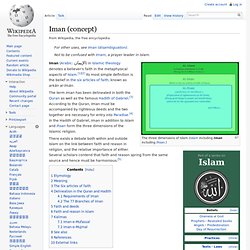
The term Iman has been delineated in both the Quran as well as the famous Hadith of Gabriel.[3] According to the Quran, Iman must be accompanied by righteous deeds and the two together are necessary for entry into Paradise.[4] In the Hadith of Gabriel, Iman in addition to Islam and Ihsan form the three dimensions of the Islamic religion. There exists a debate both within and outside Islam on the link between faith and reason in religion, and the relative importance of either. Several scholars contend that faith and reason spring from the same source and hence must be harmonious.[5] Liberal movements within Islam.
List of expeditions of Muhammad. Aisha. ‘Ā’ishah bint Abī Bakr (613/614 – 678 CE;[1] Arabic: عائشة transliteration: ‘Ā’ishah [ʕaːʔiʃa], also transcribed as A'ishah, Aisyah, Ayesha, A'isha, Aishat, Aishah, or Aisha /ˈɑːiːˌʃɑː/[2]) was one of Muhammad's wives.[3] In Islamic writings, her name is thus often prefixed by the title "Mother of the Believers" (Arabic: أمّ المؤمنين umm al-mu'minīn), per the description of Muhammad's wives in the Quran.[4][5][6] The majority of traditional hadith sources state that Aisha was married to Muhammad at the age of six or seven, but she stayed in her parents' home until the age of nine, or ten according to Ibn Hisham,[7] when the marriage was consummated with Muhammad, then 53, in Medina;[8][9][10] Aisha had an important role in early Islamic history, both during Muhammad's life and after his death.

In Sunni tradition, Aisha is thought to be scholarly and inquisitive. Her father, Abu Bakr, became the first caliph to succeed Muhammad, and after two years was succeeded by Umar. Early life. Apostasy in Islam. Countries with death penalty for the crime of apostasy Apostasy in Islam (Arabic: ردة riddah, literally means: "relapse" or "regress" but usually translates to "apostasy", or ارتداد irtidād) is commonly defined in Islam as the rejection in word or deed of one's former religion (apostasy) by a person who was previously a follower of Islam.
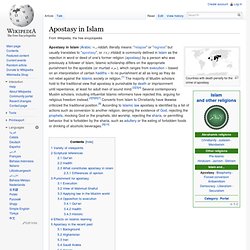
Variety of viewpoints[edit] In medieval times, several Sunni schools of Islamic jurisprudence held that apostasy by a male Muslim is punishable by death, differing on whether to execute the apostate immediately or grant the apostate an initial opportunity to repent and thus avoid penalty. Medieval Islamic scholars also differed on the punishment of a female apostate: death, enslavement, or imprisonment until repentance. Abu Hanifa and his followers refused the death penalty for female apostates, supporting imprisonment until they re-embrace Islam. Ex-muslim.org.uk/wp-content/uploads/2013/12/Apostasy_Report_Web1.pdf. Islamism. Islamism (Islam + -ism) or political Islam (Arabic: إسلام سياسي Islām siyāsī; or الإسلامية al-Islāmīyah) is a set of ideologies holding that "Islam should guide social and political as well as personal life".[1] "Islamism" is a controversial neologism whose definition sometimes varies (see next section).
Islamists can have varying interpretations on various Quranic suras and ayahs.[2] Leading Islamist thinkers[who?] Emphasize the implementation of Sharia (Islamic law); of pan-Islamic political unity; and of the selective removal of non-Muslim, particularly Western military, economic, political, social, or cultural influences in the Muslim world that they believe to be incompatible with Islam.[3] Some observers[who?] Fatwa. A fatwā (Arabic: فتوى; plural fatāwā Arabic: فتاوى) in the Islamic faith is the term for the legal opinion or learned interpretation that a qualified jurist or mufti can give on issues pertaining to the Islamic law.[1] The person who issues a fatwā is called, in that respect, a Mufti, i.e. an issuer of fatwā, from the verb أَفْتَى 'aftā = "he gave a formal legal opinion on".
This is not necessarily a formal position since most Muslims argue that anyone trained in Islamic law may give an opinion (fatwā) on its teachings. If a fatwā does not break new ground, then it is simply called a ruling.[2] An analogy might be made to the issue of legal opinions from courts in common-law systems. Fatwās generally contain the details of the scholar's reasoning, typically in response to a particular case, and are considered binding precedent by those Muslims who have bound themselves to that scholar, including future muftis; mere rulings can be compared to memorandum opinions. Criticism of Islam. "Opposition to Islam" redirects here. For criticism of political Islam, see Criticism of Islamism.
For fear of or prejudice against Islam, rather than criticism, see Islamophobia. Criticism of Islam has existed since Islam's formative stages. Early written criticism came from Christians, prior to the ninth century, many of whom viewed Islam as a radical Christian heresy.[1] Hindus and Zoroastrians made notable criticism as well.
Later the Muslim world itself offered criticism.[2][3][4] Quran and violence. The Quran's teachings on violence and war have long been topics of heated debate. Verses in the text, such as, "Fight in the name of your religion with those who fight against you," seem to many to be unequivocal endorsements of violence. [1] On the other hand, scholars argue that such verses of the Quran are interpreted out of context,[2][3] and argue that when the verses are read in context it clearly appears that the Quran prohibits aggression,[4][5][6] and allows fighting only in self-defense.[7][8] Charles Matthews writes that there is a "large debate about what the Quran commands as regards the "sword verses" and the "peace verses".
According to Matthews, "the question of the proper prioritization of these verses, and how they should be understood in relation to one another, has been a central issue for Islamic thinking about war. Islamic views on sin. Criticism of Hadith. The criticism of Hadith refers to critique directed towards canonised reports concerning the deeds and sayings of the Islamic prophet, Muhammad that are known as (the) Hadith. The criticism revolves primarily around the question of the authenticity of hadith reports and whether they are attributable to Muhammad.
This criticism also challenges the authority of the hadith to provide rulings on legal and religious matters when the Quran has already declared itself "complete", "clear", "detailed" and "perfect" in numerous verses (e.g. 11:1, 12:1, 6:115, 6:38, 6:114, 16:89). It is argued by these Muslims that using the Quran as the sole axiom, all matters in Islam requiring guidance can be deduced directly from the Quran, while anything that is left outside the Quran is by definition outside the scope of importance and thus requires no ruling. Islam and violence. Islam's doctrines and texts have in some cases been associated with violence. This article deals with the juxtaposition in Islamic law and theology of violence and non-violence by groups and individuals. Attitudes and laws towards both violence and peace exist within the Islamic tradition. Pacifism in Islam is primarily associated with the Ahmadiyya, Alevi, and Mouride sects.
Mainstream Islamic law stipulates detailed regulations for the use of violence, including the use of violence within the family or household, the use of corporal or capital punishment, as well as how and when to wage war. Religious war.
Five Pillars of Islam. Islamic views on slavery. Women in Islam. Sharia provides for complementarianism,[11] differences between women's and men's roles, rights, and obligations. Being a Muslim is more than a religious identity; Islam outlines and structures ways in which Muslim women should live their lives on a day-to-day basis.[12] Islam mandates that a woman must have her husband’s permission to leave the house and take up employment.[13][14][15] In majority Muslim countries women exercise varying degrees of their religious rights with regards to marriage, divorce, legal status, dress code, and education based on different interpretations. Islamic terrorism. LGBT in Islam. LGBT and Islam is influenced by the religious, legal and cultural history of the nations with a sizable Muslim population, along with specific passages in the Qur'an and statements attributed to the Islamic prophet Muhammad (hadith).
Hadiths traditionally are not interpreted because their language is understood to be simple matter-of-fact language. Criticism of Muhammad. Criticism of Muhammad has existed since the 7th century, when Muhammad was decried by his non-Muslim Arab contemporaries for preaching monotheism. During the Middle Ages he was frequently seen in European and other non-Muslim polemics as a Christian heretic, and/or possessed by demons. In modern times, criticism has also dealt with Muhammad's sincerity in claiming to be a prophet, his ownership of slaves, his morality and his marriages. Jihad. Female figures in the Quran. Quran and miracles. Criticism of the Quran. Prophets in Islam. Pre-Islamic Arabia. Sharia. Hadith. Islam.
Muhammad. Quran. Bad teachings. Good teachings. The Noble Qur'an - القرآن الكريم.